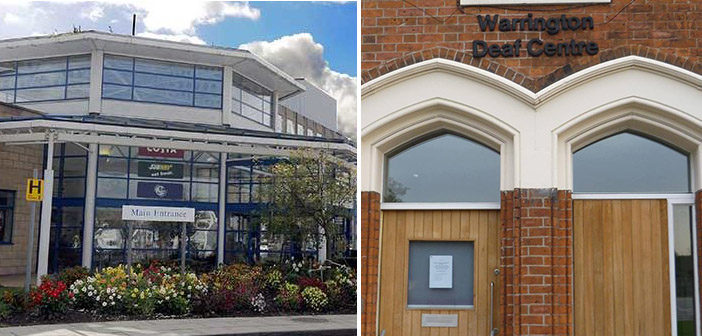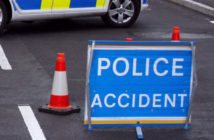WARRINGTON & Halton Hospitals has said it is “deeply sorry” after members of Warrington’s deaf community faced significant barriers while attending appointments.
On occasions deaf patients found themselves with no interpreters, leading to wrong diagnoses and misunderstandings and on one occasion a 10-year-old girl became overwhelmed after being asked to interpret for her mother.
One pregnant woman says she was refused an interpreter by midwives while in labour and later collapsed due to loss of blood.
The Independent report on Deaf People’s experiences at Warrington & Halton Hospitals NHS Trust was carried out by local health and social care champion Healthwatch Warrington.
Healthwatch Warrington was initially approached by Signing Solutions to discuss the issues that the Deaf community in Warrington were experiencing with Hospital access.
This was discovered via outreach and support that they were providing within the Deaf Centre. Healthwatch was invited to speak to the Deaf community directly via focus groups which were supported by BSL interpreters.
There are roughly 100 members registered at the Deaf Centre, 75% of which are Deaf and 25% are hard of hearing. Interviews took place with 40 participants who had experiences at the hospital.
96% of those who responded needed some form of BSL interpreter on hand for them to understand what they were being told/ course of action. 93% said they had attended and been left without an interpreter with some saying they hadn’t even been offered the option of an online interpreter and were left not fully understanding what they were being told.
One person said that due to the lack of interpreters they had been “Misdiagnosed and felt fobbed off”. Family members had also been used as interpreters and found it overwhelming.
One said: “They asked my daughter to interpret. She is only 10, my daughter was overwhelmed by the big words and started to get upset, so we had to stop”.
One person was told that their daughter wasn’t allowed to interpret for her and that they would arrange for an interpreter to come. When no one showed up they then let the daughter help.
When patients are offered an online interpreter, they state that it is not great due to connectivity in the hospital and often freezes on them.
Another said: “When I was pregnant, I was refused an interpreter by midwives. I didn’t know what was going on. I was refused a midwife when in labour and my dad had to come to the delivery room to interpret. After the birth I kept trying to tell the midwives I felt dizzy, but they ignored me. I collapsed and it was only on day 3 that they finally got an interpreter and they explained that I collapsed because I’d lost a lot of blood”.
Almost all the deaf patients Healthwatch spoke to had a medical appointment cancelled due to a lack of interpreter. 86% said that an appointment has been cancelled and many stated that this had happened on more than one occasion.
It was felt Staff needed more deaf awareness – and the same interpreter for appointments for continuity.
It was noted the frustration most of the patients had with having to remind medical settings that there they were Deaf. One said: “It should be on my file that I am deaf and need an interpreter, so I don’t have to chase it”.
The consensus from the feedback sessions was that Primary Care settings were not sufficiently Deaf-aware. When an interpreter is not available the common solution is to ask people to write it down, however, this is not possible with most d/Deaf people not understanding the written word.
There was also a sense of frustration that before the appointment, people/staff aren’t aware that the patient is d/Deaf, and the patient feels there are constant barriers when accessing healthcare compared to the way that an able-hearing person does.
The d/Deaf community wants more people, especially in medical settings to be Deaf aware and that access to an interpreter should be an essential requirement for appointments.
Since the start of this project BSL 999 has been launched which will be a welcome service to the Deaf community. They felt further improvements were needed.
The report recommended:
Deaf awareness for Health Practitioners
Access to Deaf awareness training for medical practitioners so they know the limitations and what to expect.
Medical Record Flag
Medical records should reflect on patients’ notes about their needs for the appointment so that the practitioner and patient can have the best possible experience. An organised Interpreter on arrival, physical/ online (with a secure network) would allow quicker effective communication. Admin staff to be trained on awareness that d/Deaf patients cannot respond to phone calls/ letters etc.
On-call interpreter rota
An on-call rota be considered. Therefore, if someone attends a hospital in an emergency an interpreter can be contacted directly in line with the rota. It is time consuming phoning through a list of interpreters with no expectation of success. However, if there was an on-call rota then it is likely that only one phone call would be needed and that person would have already agreed to their availability.
BSL advocacy booking service.
At the moment appointments are sent out with a notation stating if you need an Interpreter, you should contact the hospital. This can be problematic as it relies on the person being able to read that statement in the first instance.
The hospital should already have the information recorded that a person is Deaf and the responsibility to arrange an interpreter sits with the service provider (accessible information standard).
Information in QR codes or BSL videos on GP & hospital screens
This would allow d/Deaf people to have information, for instance how to check for cancers etc.
Interpreter services
From research completed,it was recommended that interpreter services are monitored at the hospital.
Lydia Thompson CEO Healthwatch Warrington, said: “We would like to thank Signing Solutions who have collaborated with us on this project and all the members of the Deaf Community. The BSL interpreters and students that assisted and WHHFT Patient Engagement and Inclusion Team.
We are aware that work is underway to improve experiences by Warrington and Halton Hospital.”
Warrington Society For Deaf People is a voluntary self-funding organisation and does not receive funding from Warrington Hospital or Warrington Council.
Commenting on the findings of the report, officers of Warrington and District Society for Deaf People said in a joint statement: “We provide support in various ways to the Deaf community. However we are finding that a high percentage of our time is taken up by supporting people in contacting the hospital informing them that a Deaf person has an appointment and requires a British Sign Language Interpreter to be present. However even though we have spent hours arranging for an Interpreter , on arrival at the hospital more often than not there is no Interpreter for the appointment. Deaf people are very frustrated and upset by this as the appointment on many occasions has to be rearranged and often again for the following appointments still no Interpreter is available. Deaf people are informed by letter of the appointment which is written in English. However many Deaf people do not read in an English grammatical form and we have to Interpret the letter to them. Surely this is not cost-effective from the perspective of the hospital and a waste of time for the service user . We have evidence that in some cases that the delay or repeated cancellation of appointments has resulted in a late serious diagnosis.
“From feedback we have received, from the perspective of Warrington’s Deaf community is that Warrington Hospital should be revisiting their contract agreement with the current service provider for Interpreting services , as they should be a 24/7 service available . However they don’t seem to be able to meet this need, evidenced by the fact that calls are made to the hospital informing them that the Deaf person requires an Interpreter to be told by the agency we have not got anyone available, and appointments having to be rearranged and still on many occasions no Interpreter attending . This appears to be a vicious circle.
“There is also a problem if Deaf people attend the A&E department or are an in the hospital as an in patient. Yet again provision of Interpreters is sporadic, as staff tell Deaf people they are trying to get an Interpreter but to no avail.
“As an organisation we would fully support the ongoing developments which would mean working in partnership with Warrington Hospital to ensure an easier and more accessible service.”
In response to the findings of the report WHH Deputy Chief Nurse Ali Kennah said: “We recognise the significant barriers in accessing services experienced by members of the d/Deaf community in Warrington from this report. Because of this we are deeply sorry to read the sense of frustration felt by members of our community in accessing healthcare, whether that be in emergency, outpatient or elective surgery settings. We also recognise the need to ensure that more people across our hospital settings are d/Deaf aware and are putting steps in to enable this with training, supported by lived experience stories.
“Our Patient Experience and Inclusion Team, following the engagement event, commenced work to address some of the barriers that were found through discussion with members of the deaf community. As a Trust, following the event at the Deaf Club in Warrington, we have implemented the following steps:
– A digital patient story was developed, completed in British Sign Language (BSL) by a service user at our hospital, this was to support staff awareness and training focusing on their experience and how they felt accessing our hospital. This video was shared at our Quality Assurance Committee, attended by the Trust Executive Team as well as other forums for learning.
– We commissioned a six-week BSL course which was attended by a variety of colleagues across the Trust where learning has been embedded into working practices. This course focused on understanding and using a limited range of simple health-related words and sentences, learning everyday conversations in BSL and the challenges that are faced by members of the d/Deaf community on a daily basis.
– Learnings from this course have resulted in us reviewing providers to commission additional deaf awareness training, initially targeting colleagues at first point of contact for admission to hospital.
– We have and will continue to review the suitability of our interpretation provisions. We recognised at this engagement event the need to clearly communicate both our emergency access to a BSL interpreter and the need to have a physical interpreter available to visit our hospital sites. As a Trust we continue to use the Deafness Resource Centre to provide interpretation services, where all language professionals are registered with the National Registers of Communication Professionals working with Deaf and Deafblind People (NRCPD). This service also includes a 24/7 emergency route which we have and will continue to refresh our colleague’s knowledge on how to access this.
– Extensive work to meet the Accessible Information Standards, including a refreshed policy, training rollout and deployment plan – supported by lived experience.
She added: “In August 2022 following this engagement event, we launched our new Patient, Service User and Carers Diversity, Inclusion and Belonging Strategy 2022-2025. This strategy included extensive engagement both internally and with our local communities, with a member of Signing Solutions attending one of our engagement sessions.
As part of this strategy, we aim to create a culture whereby all patients can access and utilise our services freely without discrimination, harassment or victimisation – creating a sense of belonging to our local NHS.
“We will therefore continue to work with the d/Deaf community in Warrington and other parts of our local community. We will work collectively but also with individuals as experts by experience to continue to learn and ensure that our services are accessible to them. In response to this report, we will ensure that the recommendations are detailed within our Diversity, Inclusion and Belonging Strategy 2022-2025 work plans. We will monitor our compliance against them at our Patient Equality, Diversity and Inclusion Sub-Committee and continue to be open and transparent with our local communities.”




